Professionalism in Nursing: Behaviors and Responsibilities
VerifiedAdded on 2023/04/11
|6
|900
|200
Essay
AI Summary
This essay examines the multifaceted concept of professionalism within the nursing field. It begins by defining professionalism as the adherence to ethical values that uphold a healthy workplace environment, emphasizing its importance in achieving positive outcomes for patients, organizations, and the healthcare system. The essay then delves into the key characteristics of a professional nurse, including being knowledgeable, ethical, and demonstrating honesty and integrity to ensure patient-centered care. It further explores professional behaviors such as maintaining professional boundaries and taking professional responsibility and accountability. The essay references several studies to support its arguments, highlighting the significance of these aspects in promoting patient well-being, fostering trust, and ensuring the delivery of safe and effective care. In conclusion, the essay underscores the critical role of professionalism in shaping nursing practice and contributing to a successful healthcare environment.
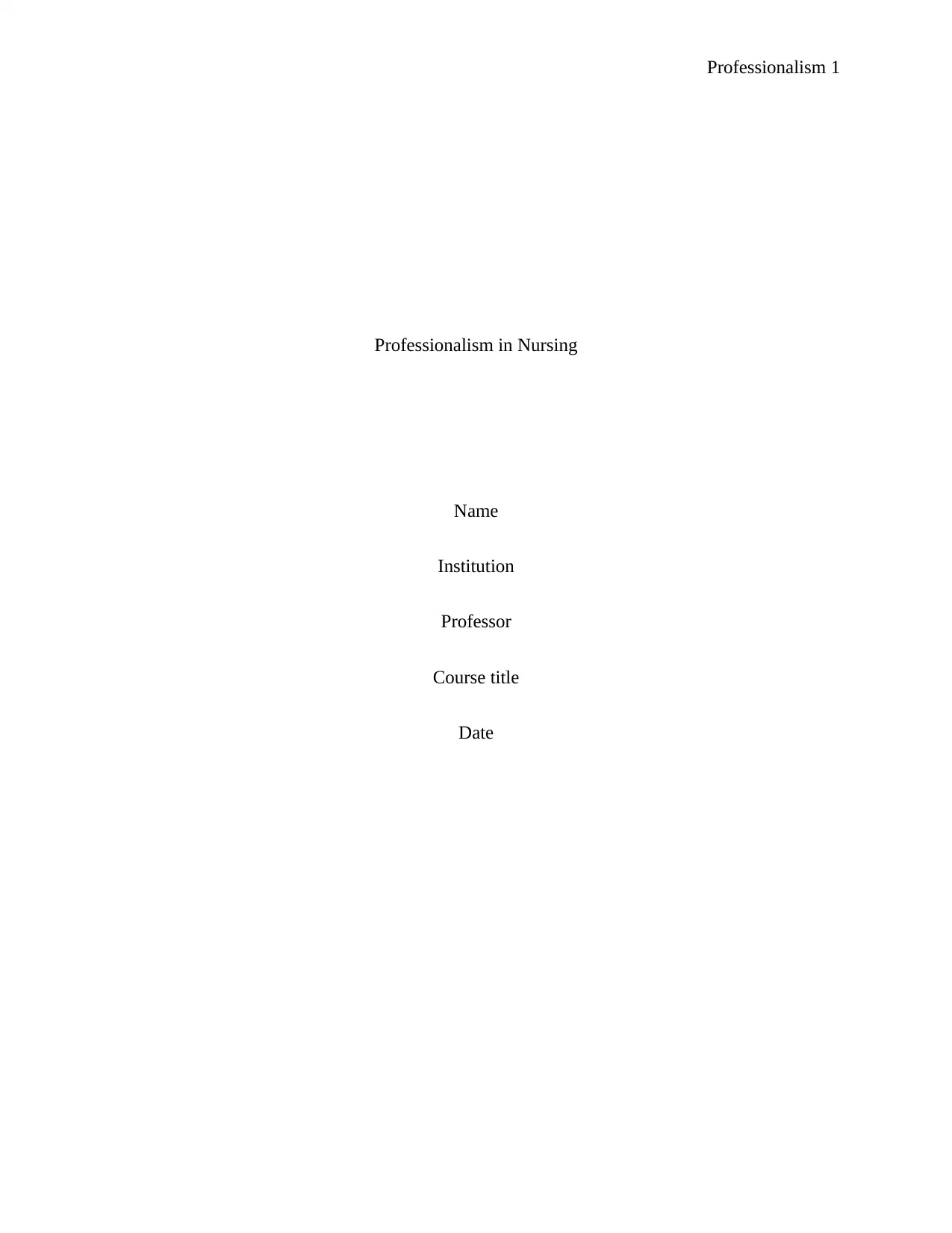
Professionalism 1
Professionalism in Nursing
Name
Institution
Professor
Course title
Date
Professionalism in Nursing
Name
Institution
Professor
Course title
Date
Paraphrase This Document
Need a fresh take? Get an instant paraphrase of this document with our AI Paraphraser
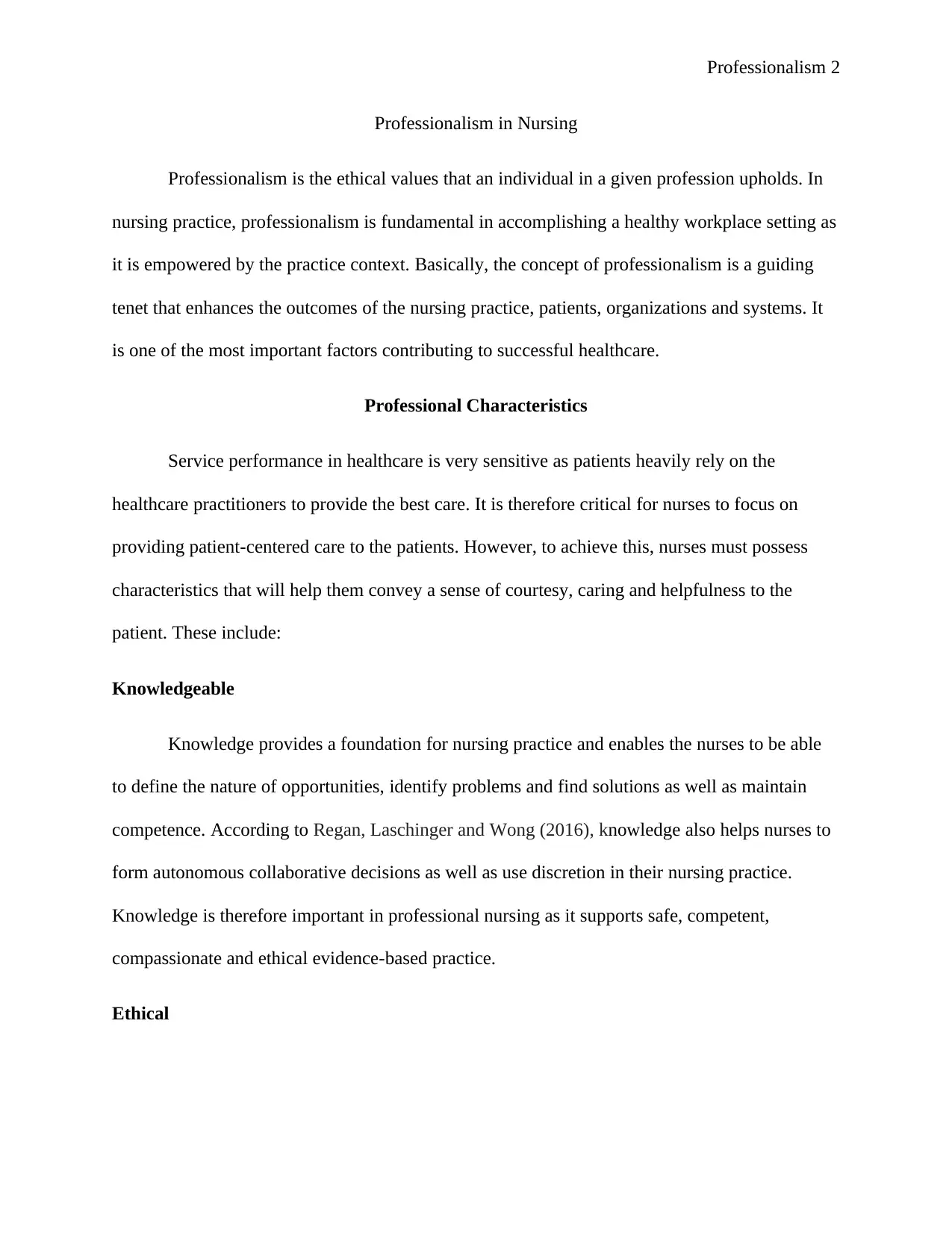
Professionalism 2
Professionalism in Nursing
Professionalism is the ethical values that an individual in a given profession upholds. In
nursing practice, professionalism is fundamental in accomplishing a healthy workplace setting as
it is empowered by the practice context. Basically, the concept of professionalism is a guiding
tenet that enhances the outcomes of the nursing practice, patients, organizations and systems. It
is one of the most important factors contributing to successful healthcare.
Professional Characteristics
Service performance in healthcare is very sensitive as patients heavily rely on the
healthcare practitioners to provide the best care. It is therefore critical for nurses to focus on
providing patient-centered care to the patients. However, to achieve this, nurses must possess
characteristics that will help them convey a sense of courtesy, caring and helpfulness to the
patient. These include:
Knowledgeable
Knowledge provides a foundation for nursing practice and enables the nurses to be able
to define the nature of opportunities, identify problems and find solutions as well as maintain
competence. According to Regan, Laschinger and Wong (2016), knowledge also helps nurses to
form autonomous collaborative decisions as well as use discretion in their nursing practice.
Knowledge is therefore important in professional nursing as it supports safe, competent,
compassionate and ethical evidence-based practice.
Ethical
Professionalism in Nursing
Professionalism is the ethical values that an individual in a given profession upholds. In
nursing practice, professionalism is fundamental in accomplishing a healthy workplace setting as
it is empowered by the practice context. Basically, the concept of professionalism is a guiding
tenet that enhances the outcomes of the nursing practice, patients, organizations and systems. It
is one of the most important factors contributing to successful healthcare.
Professional Characteristics
Service performance in healthcare is very sensitive as patients heavily rely on the
healthcare practitioners to provide the best care. It is therefore critical for nurses to focus on
providing patient-centered care to the patients. However, to achieve this, nurses must possess
characteristics that will help them convey a sense of courtesy, caring and helpfulness to the
patient. These include:
Knowledgeable
Knowledge provides a foundation for nursing practice and enables the nurses to be able
to define the nature of opportunities, identify problems and find solutions as well as maintain
competence. According to Regan, Laschinger and Wong (2016), knowledge also helps nurses to
form autonomous collaborative decisions as well as use discretion in their nursing practice.
Knowledge is therefore important in professional nursing as it supports safe, competent,
compassionate and ethical evidence-based practice.
Ethical
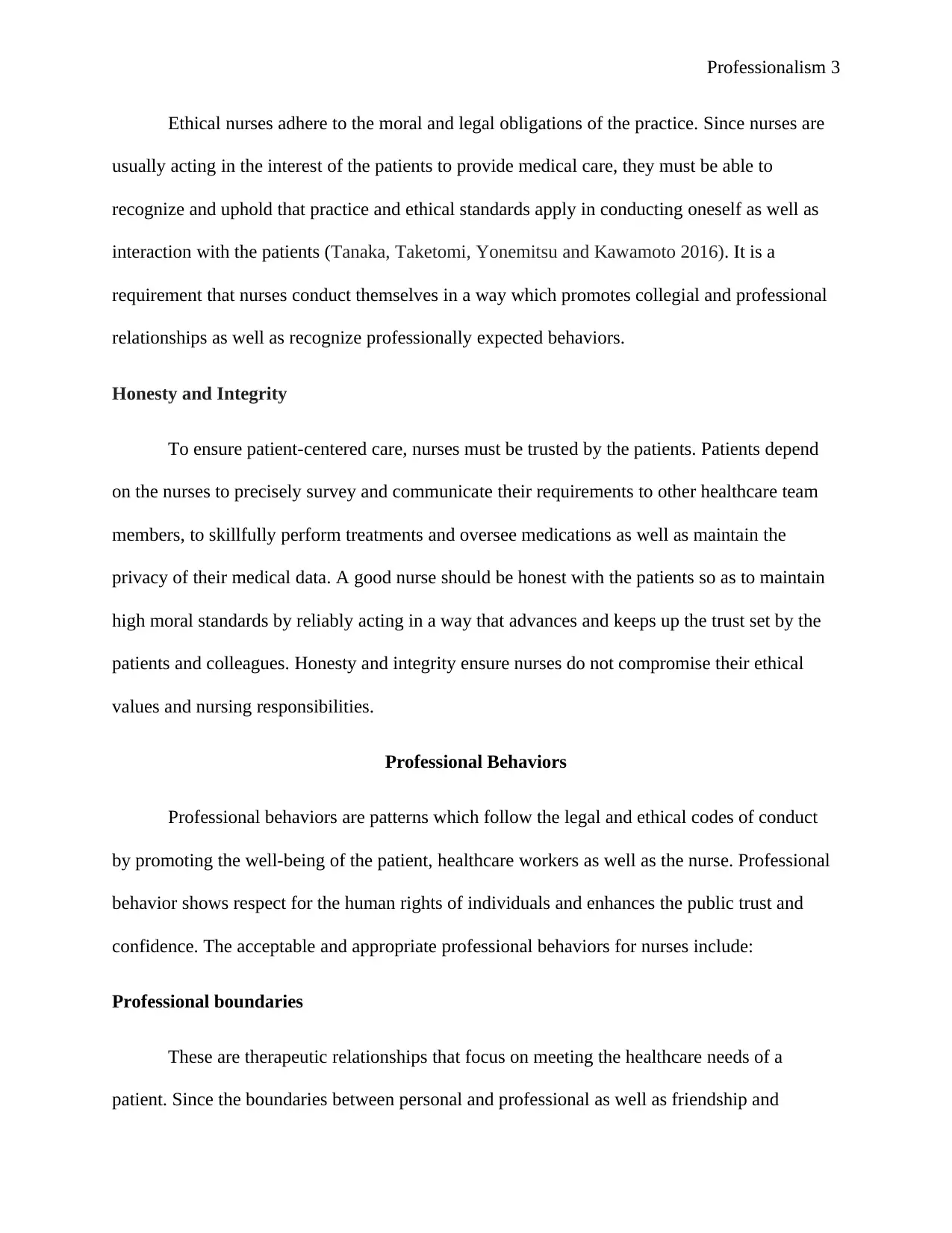
Professionalism 3
Ethical nurses adhere to the moral and legal obligations of the practice. Since nurses are
usually acting in the interest of the patients to provide medical care, they must be able to
recognize and uphold that practice and ethical standards apply in conducting oneself as well as
interaction with the patients (Tanaka, Taketomi, Yonemitsu and Kawamoto 2016). It is a
requirement that nurses conduct themselves in a way which promotes collegial and professional
relationships as well as recognize professionally expected behaviors.
Honesty and Integrity
To ensure patient-centered care, nurses must be trusted by the patients. Patients depend
on the nurses to precisely survey and communicate their requirements to other healthcare team
members, to skillfully perform treatments and oversee medications as well as maintain the
privacy of their medical data. A good nurse should be honest with the patients so as to maintain
high moral standards by reliably acting in a way that advances and keeps up the trust set by the
patients and colleagues. Honesty and integrity ensure nurses do not compromise their ethical
values and nursing responsibilities.
Professional Behaviors
Professional behaviors are patterns which follow the legal and ethical codes of conduct
by promoting the well-being of the patient, healthcare workers as well as the nurse. Professional
behavior shows respect for the human rights of individuals and enhances the public trust and
confidence. The acceptable and appropriate professional behaviors for nurses include:
Professional boundaries
These are therapeutic relationships that focus on meeting the healthcare needs of a
patient. Since the boundaries between personal and professional as well as friendship and
Ethical nurses adhere to the moral and legal obligations of the practice. Since nurses are
usually acting in the interest of the patients to provide medical care, they must be able to
recognize and uphold that practice and ethical standards apply in conducting oneself as well as
interaction with the patients (Tanaka, Taketomi, Yonemitsu and Kawamoto 2016). It is a
requirement that nurses conduct themselves in a way which promotes collegial and professional
relationships as well as recognize professionally expected behaviors.
Honesty and Integrity
To ensure patient-centered care, nurses must be trusted by the patients. Patients depend
on the nurses to precisely survey and communicate their requirements to other healthcare team
members, to skillfully perform treatments and oversee medications as well as maintain the
privacy of their medical data. A good nurse should be honest with the patients so as to maintain
high moral standards by reliably acting in a way that advances and keeps up the trust set by the
patients and colleagues. Honesty and integrity ensure nurses do not compromise their ethical
values and nursing responsibilities.
Professional Behaviors
Professional behaviors are patterns which follow the legal and ethical codes of conduct
by promoting the well-being of the patient, healthcare workers as well as the nurse. Professional
behavior shows respect for the human rights of individuals and enhances the public trust and
confidence. The acceptable and appropriate professional behaviors for nurses include:
Professional boundaries
These are therapeutic relationships that focus on meeting the healthcare needs of a
patient. Since the boundaries between personal and professional as well as friendship and
⊘ This is a preview!⊘
Do you want full access?
Subscribe today to unlock all pages.

Trusted by 1+ million students worldwide
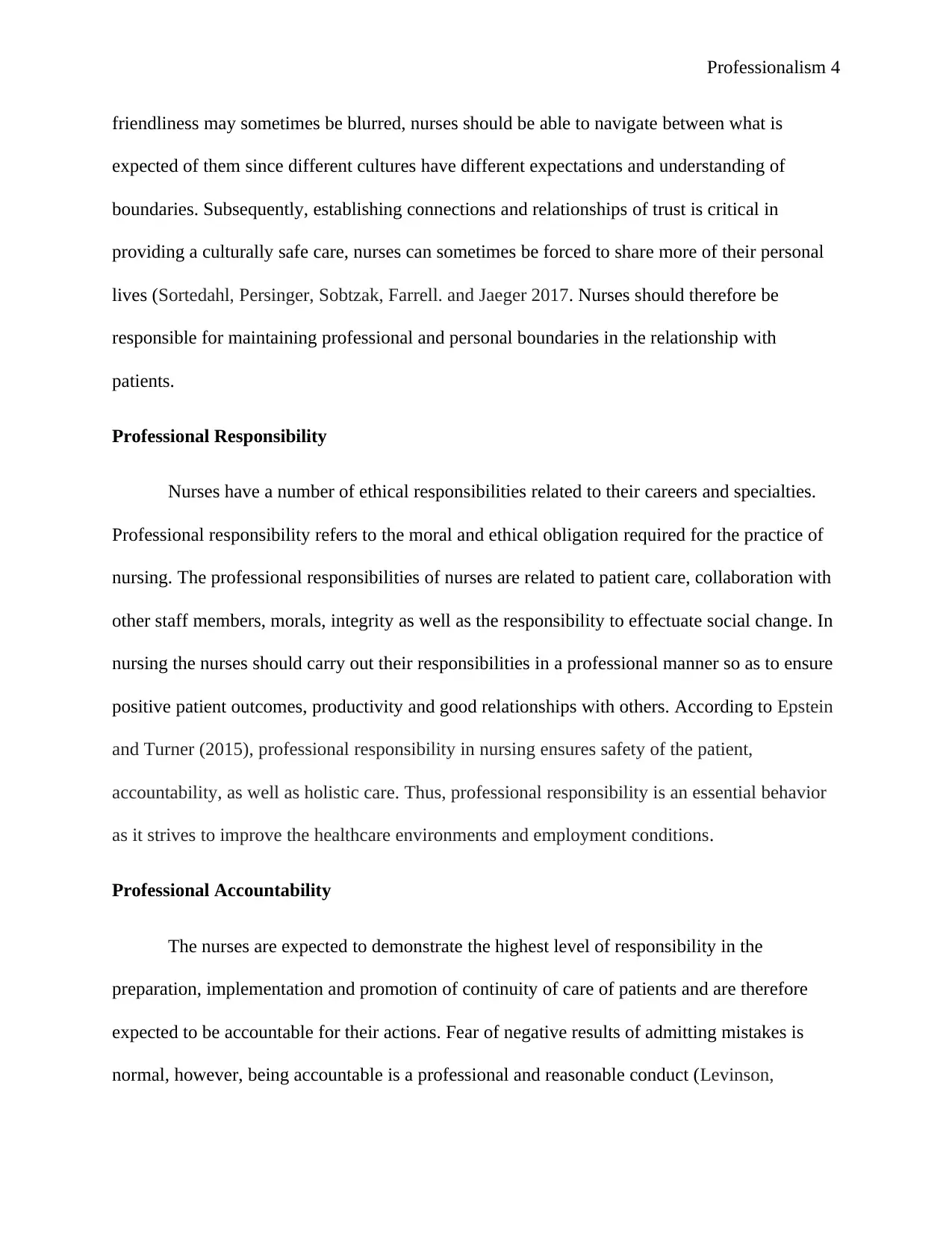
Professionalism 4
friendliness may sometimes be blurred, nurses should be able to navigate between what is
expected of them since different cultures have different expectations and understanding of
boundaries. Subsequently, establishing connections and relationships of trust is critical in
providing a culturally safe care, nurses can sometimes be forced to share more of their personal
lives (Sortedahl, Persinger, Sobtzak, Farrell. and Jaeger 2017. Nurses should therefore be
responsible for maintaining professional and personal boundaries in the relationship with
patients.
Professional Responsibility
Nurses have a number of ethical responsibilities related to their careers and specialties.
Professional responsibility refers to the moral and ethical obligation required for the practice of
nursing. The professional responsibilities of nurses are related to patient care, collaboration with
other staff members, morals, integrity as well as the responsibility to effectuate social change. In
nursing the nurses should carry out their responsibilities in a professional manner so as to ensure
positive patient outcomes, productivity and good relationships with others. According to Epstein
and Turner (2015), professional responsibility in nursing ensures safety of the patient,
accountability, as well as holistic care. Thus, professional responsibility is an essential behavior
as it strives to improve the healthcare environments and employment conditions.
Professional Accountability
The nurses are expected to demonstrate the highest level of responsibility in the
preparation, implementation and promotion of continuity of care of patients and are therefore
expected to be accountable for their actions. Fear of negative results of admitting mistakes is
normal, however, being accountable is a professional and reasonable conduct (Levinson,
friendliness may sometimes be blurred, nurses should be able to navigate between what is
expected of them since different cultures have different expectations and understanding of
boundaries. Subsequently, establishing connections and relationships of trust is critical in
providing a culturally safe care, nurses can sometimes be forced to share more of their personal
lives (Sortedahl, Persinger, Sobtzak, Farrell. and Jaeger 2017. Nurses should therefore be
responsible for maintaining professional and personal boundaries in the relationship with
patients.
Professional Responsibility
Nurses have a number of ethical responsibilities related to their careers and specialties.
Professional responsibility refers to the moral and ethical obligation required for the practice of
nursing. The professional responsibilities of nurses are related to patient care, collaboration with
other staff members, morals, integrity as well as the responsibility to effectuate social change. In
nursing the nurses should carry out their responsibilities in a professional manner so as to ensure
positive patient outcomes, productivity and good relationships with others. According to Epstein
and Turner (2015), professional responsibility in nursing ensures safety of the patient,
accountability, as well as holistic care. Thus, professional responsibility is an essential behavior
as it strives to improve the healthcare environments and employment conditions.
Professional Accountability
The nurses are expected to demonstrate the highest level of responsibility in the
preparation, implementation and promotion of continuity of care of patients and are therefore
expected to be accountable for their actions. Fear of negative results of admitting mistakes is
normal, however, being accountable is a professional and reasonable conduct (Levinson,
Paraphrase This Document
Need a fresh take? Get an instant paraphrase of this document with our AI Paraphraser
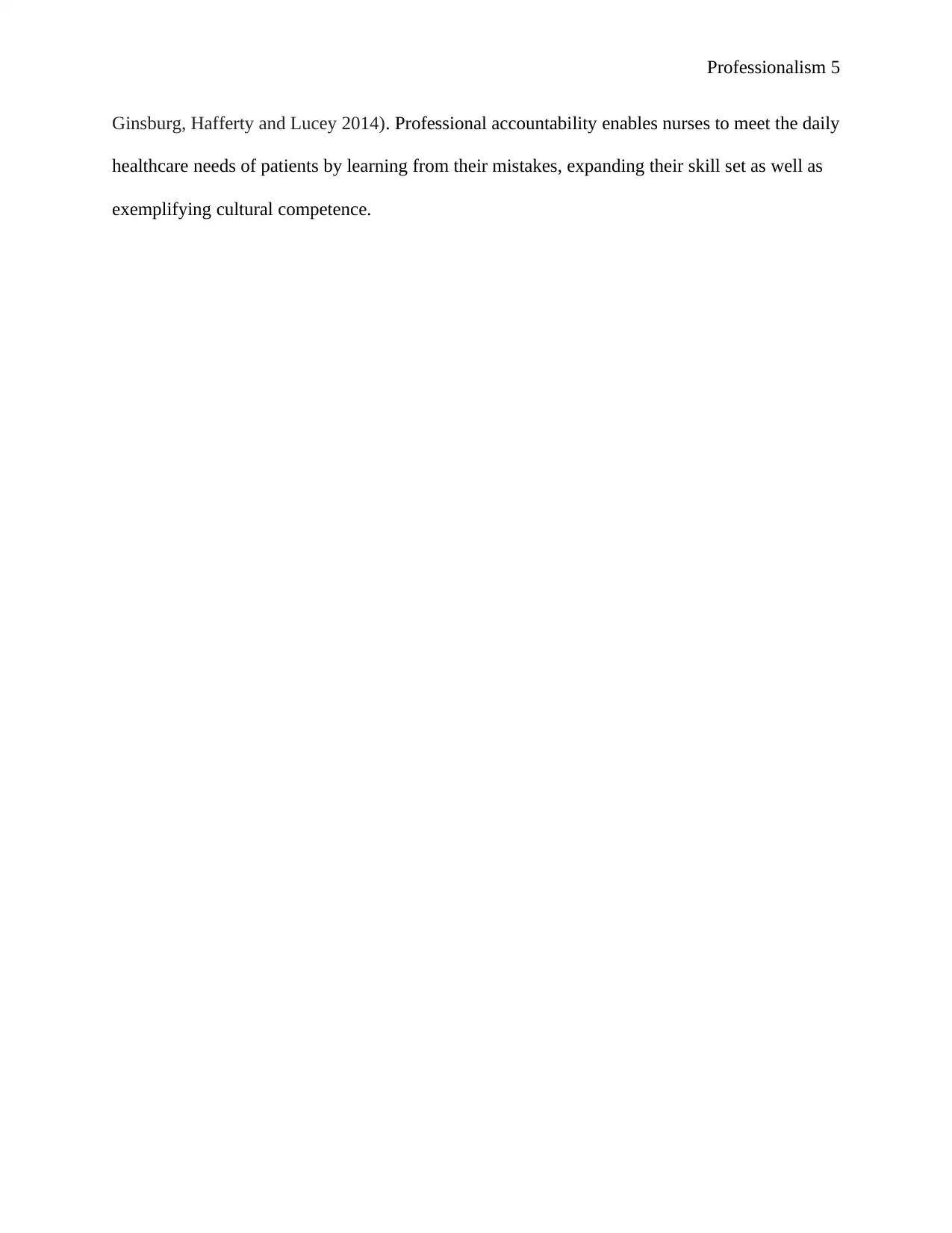
Professionalism 5
Ginsburg, Hafferty and Lucey 2014). Professional accountability enables nurses to meet the daily
healthcare needs of patients by learning from their mistakes, expanding their skill set as well as
exemplifying cultural competence.
Ginsburg, Hafferty and Lucey 2014). Professional accountability enables nurses to meet the daily
healthcare needs of patients by learning from their mistakes, expanding their skill set as well as
exemplifying cultural competence.
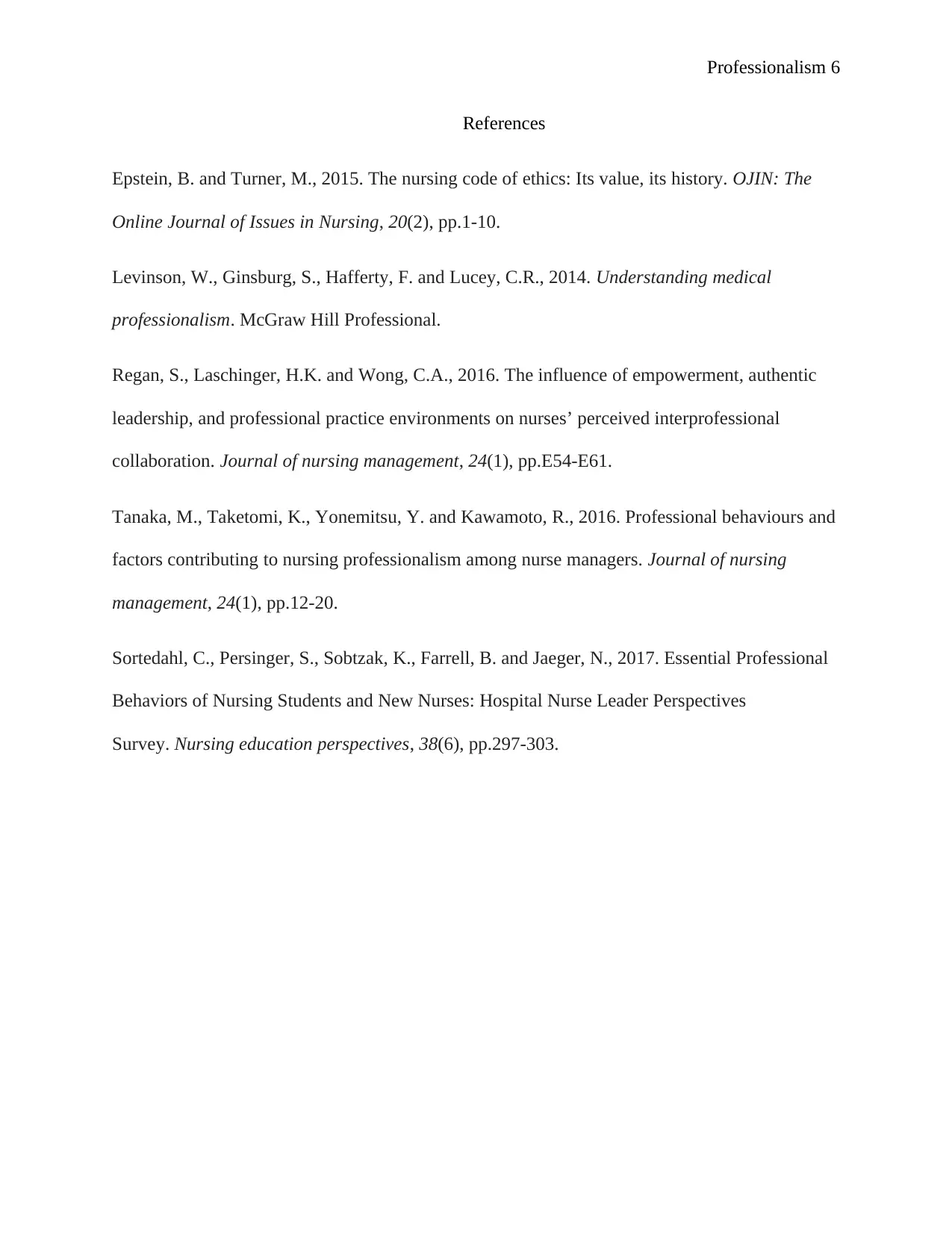
Professionalism 6
References
Epstein, B. and Turner, M., 2015. The nursing code of ethics: Its value, its history. OJIN: The
Online Journal of Issues in Nursing, 20(2), pp.1-10.
Levinson, W., Ginsburg, S., Hafferty, F. and Lucey, C.R., 2014. Understanding medical
professionalism. McGraw Hill Professional.
Regan, S., Laschinger, H.K. and Wong, C.A., 2016. The influence of empowerment, authentic
leadership, and professional practice environments on nurses’ perceived interprofessional
collaboration. Journal of nursing management, 24(1), pp.E54-E61.
Tanaka, M., Taketomi, K., Yonemitsu, Y. and Kawamoto, R., 2016. Professional behaviours and
factors contributing to nursing professionalism among nurse managers. Journal of nursing
management, 24(1), pp.12-20.
Sortedahl, C., Persinger, S., Sobtzak, K., Farrell, B. and Jaeger, N., 2017. Essential Professional
Behaviors of Nursing Students and New Nurses: Hospital Nurse Leader Perspectives
Survey. Nursing education perspectives, 38(6), pp.297-303.
References
Epstein, B. and Turner, M., 2015. The nursing code of ethics: Its value, its history. OJIN: The
Online Journal of Issues in Nursing, 20(2), pp.1-10.
Levinson, W., Ginsburg, S., Hafferty, F. and Lucey, C.R., 2014. Understanding medical
professionalism. McGraw Hill Professional.
Regan, S., Laschinger, H.K. and Wong, C.A., 2016. The influence of empowerment, authentic
leadership, and professional practice environments on nurses’ perceived interprofessional
collaboration. Journal of nursing management, 24(1), pp.E54-E61.
Tanaka, M., Taketomi, K., Yonemitsu, Y. and Kawamoto, R., 2016. Professional behaviours and
factors contributing to nursing professionalism among nurse managers. Journal of nursing
management, 24(1), pp.12-20.
Sortedahl, C., Persinger, S., Sobtzak, K., Farrell, B. and Jaeger, N., 2017. Essential Professional
Behaviors of Nursing Students and New Nurses: Hospital Nurse Leader Perspectives
Survey. Nursing education perspectives, 38(6), pp.297-303.
⊘ This is a preview!⊘
Do you want full access?
Subscribe today to unlock all pages.

Trusted by 1+ million students worldwide
1 out of 6
Related Documents
Your All-in-One AI-Powered Toolkit for Academic Success.
+13062052269
info@desklib.com
Available 24*7 on WhatsApp / Email
![[object Object]](/_next/static/media/star-bottom.7253800d.svg)
Unlock your academic potential
Copyright © 2020–2026 A2Z Services. All Rights Reserved. Developed and managed by ZUCOL.




